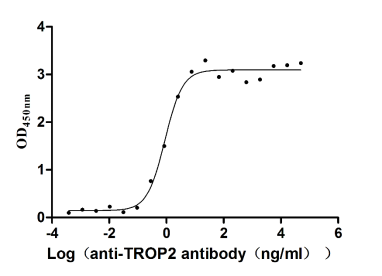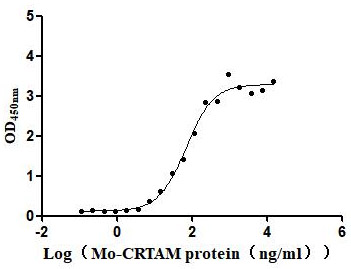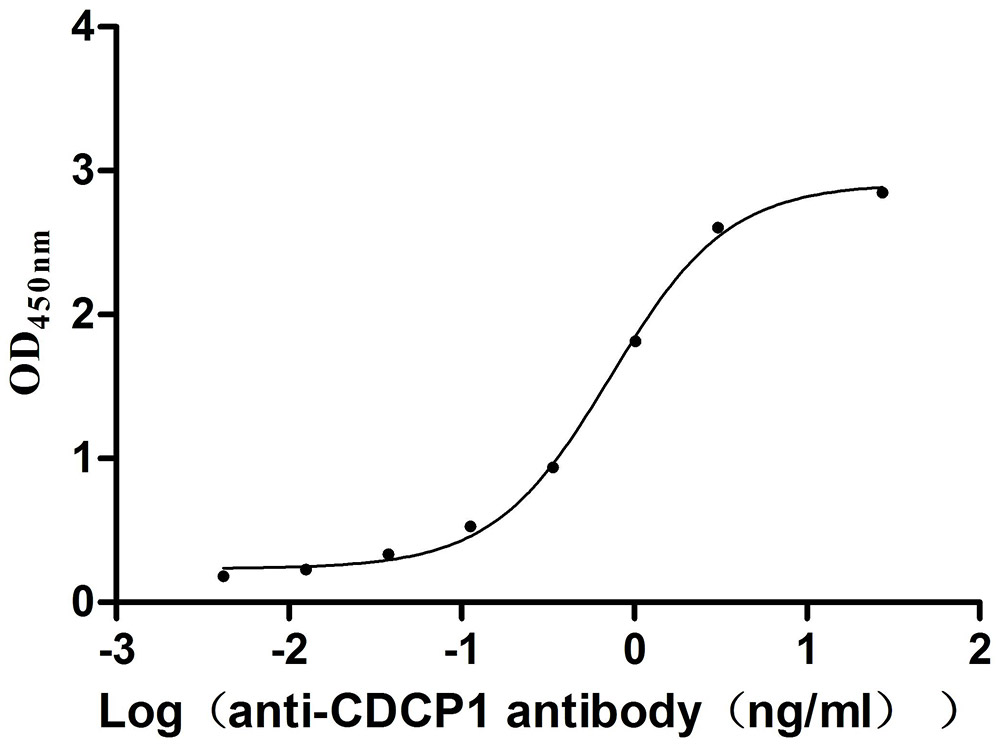Recombinant Mouse Tumor necrosis factor receptor superfamily member 10B (Tnfrsf10b), partial
-
货号:CSB-YP886404MO
-
规格:
-
来源:Yeast
-
其他:
-
货号:CSB-EP886404MO
-
规格:
-
来源:E.coli
-
其他:
-
货号:CSB-EP886404MO-B
-
规格:
-
来源:E.coli
-
共轭:Avi-tag Biotinylated
E. coli biotin ligase (BirA) is highly specific in covalently attaching biotin to the 15 amino acid AviTag peptide. This recombinant protein was biotinylated in vivo by AviTag-BirA technology, which method is BriA catalyzes amide linkage between the biotin and the specific lysine of the AviTag.
-
其他:
-
货号:CSB-BP886404MO
-
规格:
-
来源:Baculovirus
-
其他:
-
货号:CSB-MP886404MO
-
规格:
-
来源:Mammalian cell
-
其他:
产品详情
-
纯度:>85% (SDS-PAGE)
-
基因名:
-
Uniprot No.:
-
别名:Tnfrsf10b; Dr5; Killer; Tumor necrosis factor receptor superfamily member 10B; Death receptor 5; MK; CD antigen CD262
-
种属:Mus musculus (Mouse)
-
蛋白长度:Partial
-
蛋白标签:Tag type will be determined during the manufacturing process.
The tag type will be determined during production process. If you have specified tag type, please tell us and we will develop the specified tag preferentially. -
产品提供形式:Lyophilized powder
Note: We will preferentially ship the format that we have in stock, however, if you have any special requirement for the format, please remark your requirement when placing the order, we will prepare according to your demand. -
复溶:We recommend that this vial be briefly centrifuged prior to opening to bring the contents to the bottom. Please reconstitute protein in deionized sterile water to a concentration of 0.1-1.0 mg/mL.We recommend to add 5-50% of glycerol (final concentration) and aliquot for long-term storage at -20℃/-80℃. Our default final concentration of glycerol is 50%. Customers could use it as reference.
-
储存条件:Store at -20°C/-80°C upon receipt, aliquoting is necessary for mutiple use. Avoid repeated freeze-thaw cycles.
-
保质期:The shelf life is related to many factors, storage state, buffer ingredients, storage temperature and the stability of the protein itself.
Generally, the shelf life of liquid form is 6 months at -20°C/-80°C. The shelf life of lyophilized form is 12 months at -20°C/-80°C. -
货期:Delivery time may differ from different purchasing way or location, please kindly consult your local distributors for specific delivery time.Note: All of our proteins are default shipped with normal blue ice packs, if you request to ship with dry ice, please communicate with us in advance and extra fees will be charged.
-
注意事项:Repeated freezing and thawing is not recommended. Store working aliquots at 4°C for up to one week.
-
Datasheet :Please contact us to get it.
相关产品
靶点详情
-
功能:Receptor for the cytotoxic ligand TNFSF10/TRAIL. The adapter molecule FADD recruits caspase-8 to the activated receptor. The resulting death-inducing signaling complex (DISC) performs caspase-8 proteolytic activation which initiates the subsequent cascade of caspases (aspartate-specific cysteine proteases) mediating apoptosis. Promotes the activation of NF-kappa-B. Essential for ER stress-induced apoptosis.
-
基因功能参考文献:
- Death receptor5 pathway and mitochondrial pathway, which are likely mediated by HIF-1alpha, contribute to hypoxia-induced spermatocyte apoptosis. PMID: 28444885
- downregulation of cIAPs in PSC cholangiocytes may contribute to the development of the disease. Our results also indicate that inhibition of TRAIL signaling pathways may be beneficial in the treatment of PSC PMID: 28055006
- s demonstrate, for the first time, expression of TNF-related apoptosis-inducing ligand (TRAIL) and its signaling death receptor 5 (DR5) in the murine inner ear. PMID: 26791792
- Malignant transformation in the endometrium is related to reduction of membrane DR4 and DR5 expression. PMID: 23815209
- TRAIL expression by osteoclast-like cells is increased in the presence of RANKL and after scraping; DcR2 expression peaks at 24 hours, and and decreases at 5 days; DR5 expression peaks at 5 days PMID: 23430714
- Induction of death receptor 5 expression in tumor vasculature by perifosine restores the vascular disruption activity of TRAIL-expressing CD34(+) cells. PMID: 23605004
- TRAIL-DR5 interaction promoted malignant behaviors of B16F10 cells. PMID: 23347256
- results suggest that the transmembrane domains together with their adjacent stalk regions can play a major role in control of death receptor activation thereby contributing to cell type specific differences in TRAILR1 and TRAILR2 signaling PMID: 22916132
- DR5 is selectively expressed by neuroprogenitor cells and newborn neurons. PMID: 21938487
- Results suggest that excessive iodine could induce TRAIL and DR5 abnormal expression in thyroid. TRAIL band with DR5 to promote follicular cells apoptosis thus mediate thyroid destruction in EAT. PMID: 21225479
- NK cells inhibit dendritic cell cross-priming, but not direct priming, in a TRAIL/DR5-dependent manner. PMID: 21832159
- Antibody-based therapy targeting DR5 is an efficient strategy not only to eliminate TRAIL-sensitive tumor cells. PMID: 14769851
- presence and function of TRAIL and MK, a death-inducing ligand and its receptor, in mammalian preimplantation embryos. PMID: 15128592
- binding of Fas-associated death domain (FADD) to the tumor necrosis factor-related apoptosis-inducing ligand receptor DR5 is regulated by the death effector domain of FADD PMID: 15173180
- Inactivation of the TRAIL-R gene did not affect tumorigenesis in the thymus and intestines of p53 knock-out mice and mice mutated in the Adenomatous Polyposis Coli gene, respectively. PMID: 15514675
- DR5 has a limited role during embryogenesis and early stages of development but plays an organ-specific role in the response to DNA-damaging stimuli. PMID: 15713653
- ceramide acts as a common mediator of caspase-independent programmed cell death caused by death receptors such as mTRAIL-R2 and TNF-R55 PMID: 17026999
- These data demonstrate an important role for the TRAIL/DR5/FADD/caspase 8 pathway in the apoptosis associated with skeletal myoblast differentiation. PMID: 17041756
- These data represent the first indication that testicular germ cells, specifically spermatocytes, can undergo TRAIL-mediated apoptosis. PMID: 17051329
- Thus, sDR5 represents a potential novel therapeutic drug for patients with fulminant hepatitis. PMID: 17126290
- cathepsin E plays a substantial role in host defense against tumor cells through TRAIL-dependent apoptosis and/or tumor-associated macrophage-mediated cytotoxicity PMID: 18006832
- Thus TRAIL-R may function as an inflammation and tumor suppressor in multiple tissues in vivo. PMID: 18079962
- adherent TRAIL-R-expressing skin carcinoma cells were TRAIL resistant in vitro but were sensitized to TRAIL upon detachment by inactivation of the ERK signaling pathway PMID: 18079967
- Death receptor 5 mediated-apoptosis contributes to cholestatic liver disease. PMID: 18667695
- Apoptosis in experimental non-alcoholic steatohepatitis is associated with p53 activation and TRAIL receptor expression. PMID: 19226377
- Data demonstrate that cytokine induced upregulation of TRAIL, DR4 and DR5 in tubules from patients with proliferative lupus nephritis may play a protective role by enhancing survival while also exerting a proinflammatory effect. PMID: 19349211
显示更多
收起更多
-
亚细胞定位:Membrane; Single-pass type I membrane protein.
-
组织特异性:Highly expressed in heart, lung and kidney.
-
数据库链接:
KEGG: mmu:21933
STRING: 10090.ENSMUSP00000022663
UniGene: Mm.193430
Most popular with customers
-
Recombinant Human Receptor tyrosine-protein kinase erbB-2 (ERBB2), partial (Active)
Express system: Mammalian cell
Species: Homo sapiens (Human)
-
Recombinant Human Heat-stable enterotoxin receptor (GUCY2C), partial (Active)
Express system: Mammalian cell
Species: Homo sapiens (Human)
-
Recombinant Mouse Desmoglein-3 (Dsg3), partial (Active)
Express system: Mammalian cell
Species: Mus musculus (Mouse)
-
Recombinant Human Nectin-4 (NECTIN4), partial (Active)
Express system: Mammalian cell
Species: Homo sapiens (Human)
-
Recombinant Human Angiopoietin-2 (ANGPT2) (Active)
Express system: Mammalian cell
Species: Homo sapiens (Human)
-
Recombinant Human Tumor-associated calcium signal transducer 2 (TACSTD2), partial (Active)
Express system: Mammalian cell
Species: Homo sapiens (Human)
-
Recombinant Mouse Cell adhesion molecule 1 (Cadm1), partial (Active)
Express system: Mammalian cell
Species: Mus musculus (Mouse)
-
Recombinant Mouse CUB domain-containing protein 1 (Cdcp1), partial (Active)
Express system: Mammalian cell
Species: Mus musculus (Mouse)


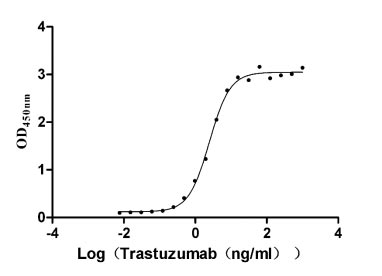
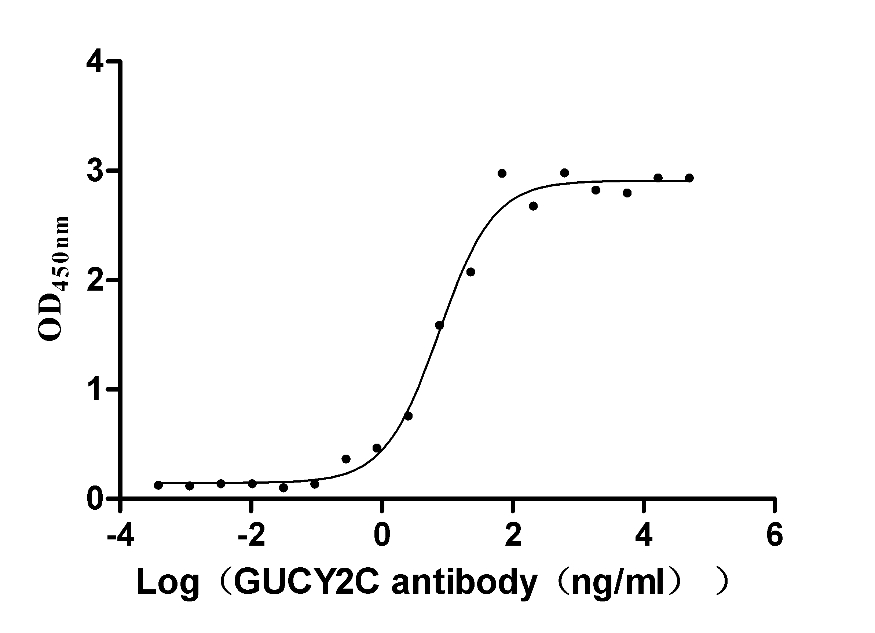
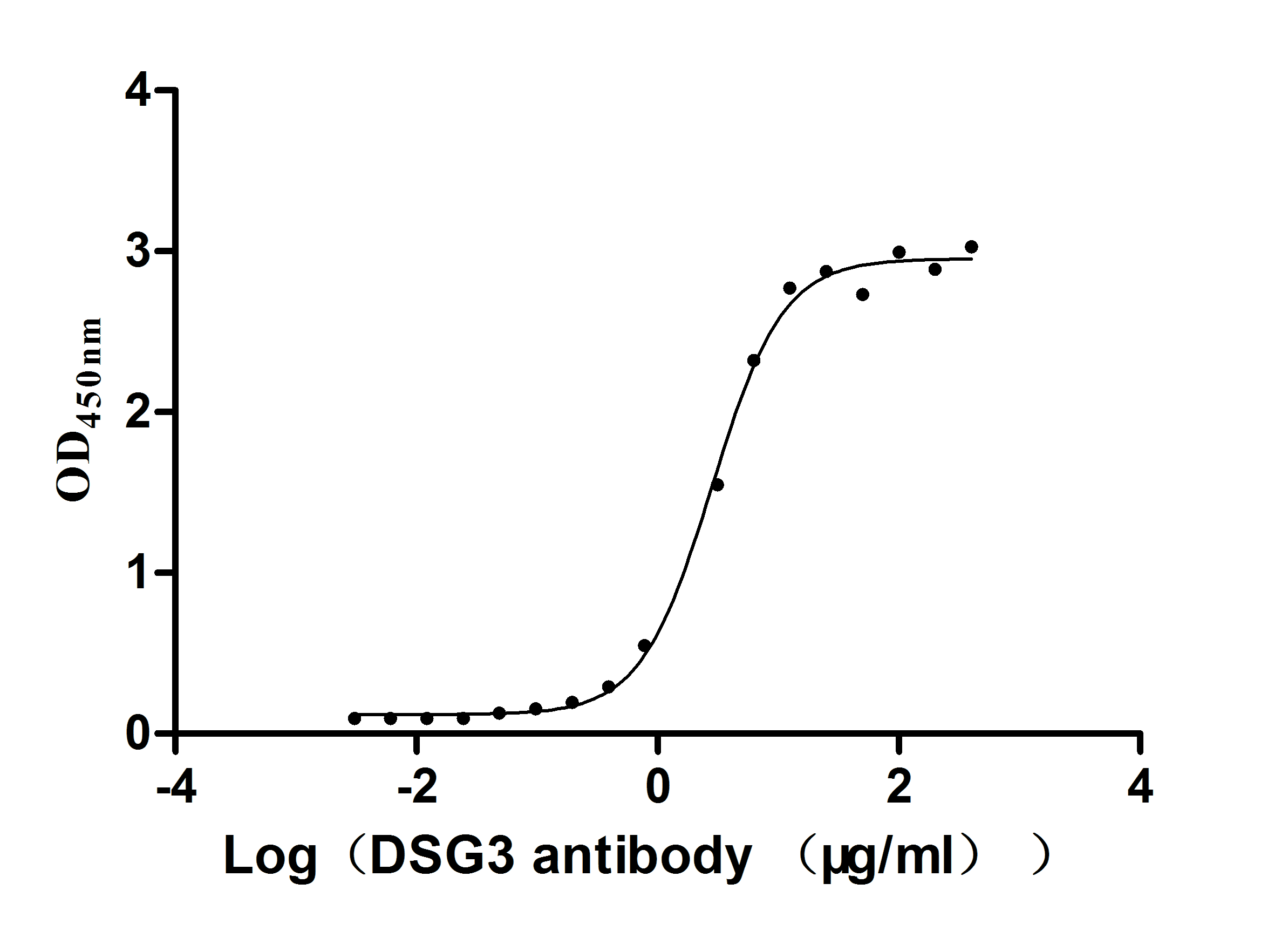
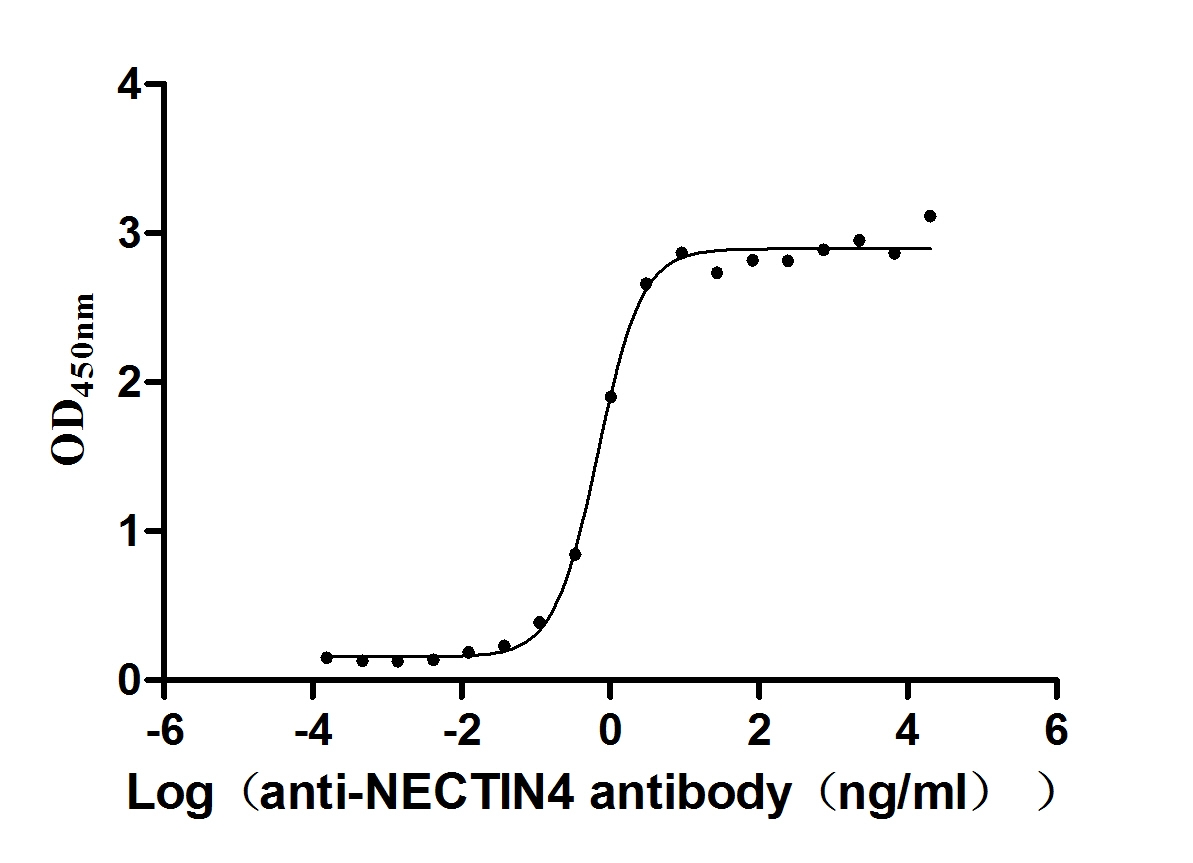
-AC1.jpg)
